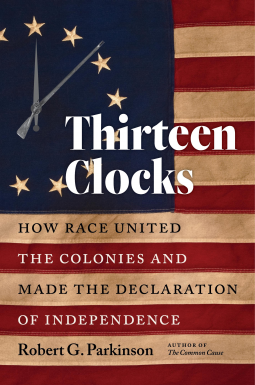
Thirteen Clocks
How Race United the Colonies and Made the Declaration of Independence
by Robert G. Parkinson
This title was previously available on NetGalley and is now archived.
Send NetGalley books directly to your Kindle or Kindle app
1
To read on a Kindle or Kindle app, please add kindle@netgalley.com as an approved email address to receive files in your Amazon account. Click here for step-by-step instructions.
2
Also find your Kindle email address within your Amazon account, and enter it here.
Pub Date May 10 2021 | Archive Date Apr 19 2021
Talking about this book? Use #ThirteenClocks #NetGalley. More hashtag tips!
Description
In his celebrated account of the origins of American unity, John Adams described July 1776 as the moment when thirteen clocks managed to strike at the same time. So how did these American colonies overcome long odds to create a durable union capable of declaring independence from Britain? In this powerful new history of the fifteen tense months that culminated in the Declaration of Independence, Robert G. Parkinson provides a troubling answer: racial fear. Tracing the circulation of information in the colonial news systems that linked patriot leaders and average colonists, Parkinson reveals how the system’s participants constructed a compelling drama featuring virtuous men who suddenly found themselves threatened by ruthless Indians and defiant slaves acting on behalf of the king.
Parkinson argues that patriot leaders used racial prejudices to persuade Americans to declare independence. Between the Revolutionary War’s start at Lexington and the Declaration, they broadcast any news they could find about Native Americans, enslaved Blacks, and Hessian mercenaries working with their British enemies. American independence thus owed less to the love of liberty than to the exploitation of colonial fears about race. Thirteen Clocks offers an accessible history of the Revolution that uncovers the uncomfortable origins of the republic even as it speaks to our own moment.
Robert G. Parkinson is associate professor of history at Binghamton University.
Advance Praise
"Parkinson's study explores the deeper and darker meanings of the American Revolution. He not only makes his widely acclaimed work, The Common Cause, more accessible but also distills its timely and powerful essence.”--Rosemary Zagarri, author of Revolutionary Backlash: Women and Politics in the American Revolution
“With his stunning debut, The Common Cause, Parkinson established himself as one of the most astute historians of the Revolution. Drawing from that exhaustive research, he has written a brilliant history of events that culminated in the Declaration of Independence. Thirteen Clocks should be read by all who are interested in the origins of the American story.”--Annette Gordon-Reed, coauthor with Peter S. Onuf of Most Blessed of the Patriarchs: Thomas Jefferson and the Empire of the Imagination
Available Editions
| EDITION | Paperback |
| ISBN | 9781469662572 |
| PRICE | $20.00 (USD) |



